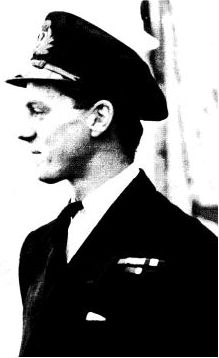- Author
- McIntosh, Ian, Sub-Lieutenant, RN
- Subjects
- Biographies and personal histories, WWII operations, History - WW2
- Tags
-
- RAN Ships
- None noted.
- Publication
- September 2008 edition of the Naval Historical Review (all rights reserved)
With the order ‘Abandon Ship’ I made my way aft to my station which was Lifeboat No. 7 stowed right aft on the starboard side. On the upper deck there were many dead or severely wounded men for whom I could do nothing. Lifeboat No. 8, on the port side, had been smashed by the shell that had destroyed our gun and killed its crew. Lifeboat No. 7 seemed to have got away fairly lightly with a few small shrapnel holes in her hull. These we stuffed temporarily with some rags. Being right by the ship’s counter, the boat was on its davits and seated on stowage chocks on the deck.

At earlier lifeboat drills we had practised getting the boat off its chocks and ready for lowering. The Third Mate and a Warrant Shipwright took charge of the lowering. The lifeboat was freed from the chocks, swung outboard and lowered. The boat, with passengers and crew all getting into it, was lying awkwardly under the starboard counter, being battered against the ship’s side by the heavy swell. I, as the most experienced seaman, was directed to go down into the boat and sort things out down there. Using the loom of four oars bearing against the ship’s side and held firmly by men in the boat, we were able to prevent damage and to move to a safer position. Moving a bit forward on the boat-rope helped and I was then, with the help of a Khelassi, one of the seamen crew, able to ship the rudder and its tiller.
All this time more and more men were coming down into the boat (from Lifeboat No. 8 naturally, as well as No. 7) – Europeans, Lascars, Madrasees, Goanese and Sikhs – these latter were not fighting men but traders and they manned the boat carrying suitcases and other bundles, each of which was thrown over the side to make room for men. The boat had a lot of water in it and when I told one of the Sikhs to start baling, he looked at me in surprise and said ‘Oh, but Sir, we are passengers’. Some rough language from me, the like of which he probably had not heard before, had him baling.
Britannia sinks
The third mate, Bill MacVicar, got four oars out forward and cleared a space in which four amateur oarsmen could work. Exhorting them, with much cursing and swearing, we managed to pull clear of the wreckage. Gathering up all the men in the water, in liferafts and badly damaged lifeboats, we dropped further astern to be clear of flotsam shooting to the surface and from where potentially dangerous eddies might be experienced when the ship went down. Soon Britannia’s forward hold filled, her bows went down and with her stern vertical, she finally slid under with a great bubble and swirl of water and the last of the steam blowing off with much loose wreckage shooting to the surface, all of which was clear of us. We streamed the sea-anchor and left the two rafts as extra drogues, then stepped the mast and set the foresail to steady the boat. This allowed the boat to lie fairly comfortably stern to wind and sea in the steady NE trade wind. We were taking in a lot of water so that baling had to be carried on continuously with teams of two or four. We could see a number of other boats, most of which seemed to be in a reasonable condition except one close to us, deeply waterlogged. Asked, by semaphore, whether we could take any more, I, in view of our already perilously overloaded and similarly waterlogged state, replied, ‘No, except on the rafts astern’. Nevertheless one wretched fellow swam over and climbed inboard, an unwelcome addition to our numbers who contributed nothing to our joint efforts. He was ultimately a survivor but continued to behave in this thoroughly selfish manner during the voyage and later ashore.
Gradually, despite lying to the sea anchor, we lost contact with all the other boats and it seemed to me that we must fend for ourselves. Organising the survivors, baling and gaining some semblance of order and control took most of the day.
